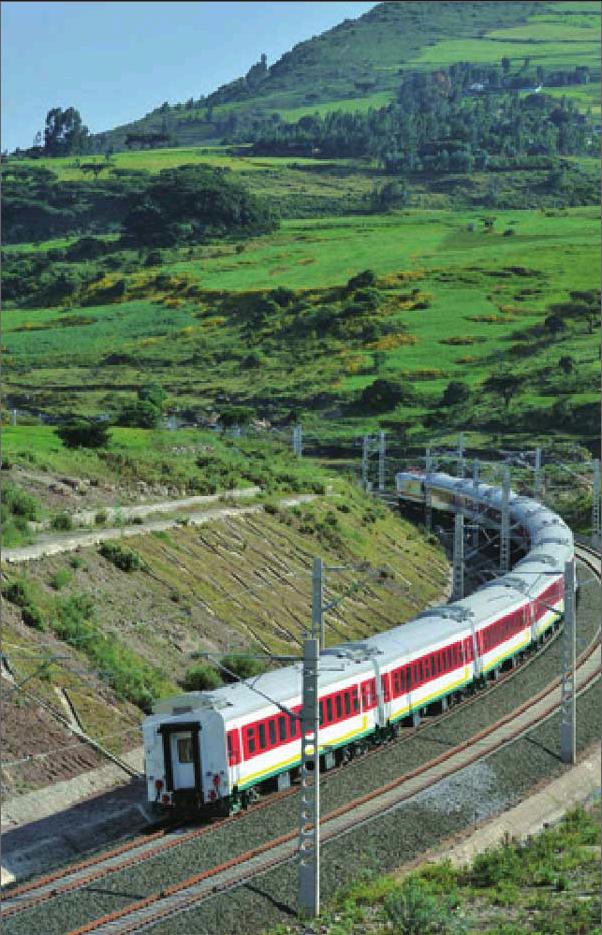Full Steam Ahead
2016-12-22BySudeshnaSarkar&
By+Sudeshna+Sarkar+&+Francois+Dube

The only rail journeys Zerihun Yimer Gelata, Deputy Director of the Ethiopian Civil Service University in Addis Ababa, has taken so far are commutes on the light rail, operated by the Shenzhen Metro Group, a Chinese stateowned enterprise.
“It is comfortable and convenient, but not very fast,” the 34-year-old said. “But the Ethiopia-Djibouti electric railway is a breakthrough. It is very important for both countries as it creates job opportunities for their citizens and enhances economic development. It will also strengthen people-topeople relationships and bring about regional integration, eventually leading to the political unity of Africa, as envisioned by the African Unions Agenda 2063 [the development blueprint for the continent].”
Five years after construction began, Africas first cross-border electric trains are finally running from Addis Ababa, capital of Ethiopia, to the Port of Djibouti in neighboring Djibouti, covering 756 km in 10 to 12 hours. Earlier, the journey had to be undertaken by road, which took several days. The older French-built diesel line, built nearly 100 years ago, fell into disuse due to lack of funds for maintenance and upgrading.
The $3.4-billion electric railway has been built by the China Railway Group and China Civil Engineering Construction Corp. (CCECC), which will also operate it for six years. The lions share of the money—70 percent—came from the Export-Import Bank of China with the Ethiopian Government providing the rest. The locomotives, coaches and wagons were built by China North Industries Corp.
Launched on October 5, the EthiopiaDjibouti Railway is now doing a three-month trial run with freight service alone. Passenger services will start from January next year, when the railway will have the capability of transporting up to 5,600 people daily as well as 3,500 tons of goods at a time. Chinese drivers and conductors are going to run the service for five years while the local staff is trained.
Getachew Betru, CEO at Ethiopian Railways, said the railway is significant for building Ethiopias national capacity in the railway industry. Fifty Ethiopians were sent to China, Russia and Britain to study railway technology. “These are the new leaders of the railway industry,” Betru said.
In addition, China Railway Construction Corp., CCECCs parent company, is working with the Ethiopian authorities to build a railway institution in Ethiopia, to train Africans in rail management.
“This railway line will change the socioeconomic landscape of our two countries,”Ethiopian Prime Minister Hailemariam Dessalegn said, as he inaugurated the line with Djiboutis President Ismail Omar Guelleh in the presence of visiting Togolese President Faure Gnassingbe and Xu Shaoshi, Chinese President Xi Jinpings special envoy and Chairman of Chinas National Development and Reform Commission.
“It will play a significant role in transforming Ethiopias industry and contribute to Ethiopia reaching middle-income status [by 2030],” Hailemariam added. “It would resolve import and export bottlenecks and enhance Ethiopias competitiveness in international markets. It is a historic project that opens a new chapter in the partnership of the three countries—Ethiopia, Djibouti and China.”
The railroad is a strategic lifeline for landlocked Ethiopia. Nearly 90 percent of its foreign trade is conducted through the Port of Djibouti, and the new line will enable manufacturers to reach the sea and deliver goods to buyers within the promised time.
Zemedeneh Negatu, Managing Partner for Ernst & Young in Ethiopia and head of transaction advisory services for Eastern Africa, ticked off the benefits one by one. “For both international and domestic investors, this is a very substantial reduction in transportation and logistics costs,” he said. “Also, from an efficiency perspective, you can now get your goods to the port much quicker. Whoever is placing orders, for example, sitting in Europe, for textiles, garments, leather, whatever it is from Ethiopia, they can now manage their supply chain much more efficiently and reliably because they know the train will be there in 10 hours. The trip by truck [in the past] used to take four days, seven days, even 10 days.”
The railway is a key part in the Ethiopian Governments plan to build, by 2020, a 5,000-km regional network of railway, which will extend to Kenya, Sudan and South Sudan. Besides boosting manufacture, it will stimulate foreign investment with Chinese, Indian and Turkish companies setting up factories in Ethiopia and looking for better infrastructure. This year, Ethiopia recorded around $2 billion in foreign direct investment, a leap from $108 million in 2009.
Easier access
At the other end, in Djibouti, the project is also a lifeline to emerge from the prevailing economic crisis. Over 40 percent of the population are still impoverished while the unemployment rate is over 60 percent. The new line will expand Djiboutis businesses by giving them easier access to Ethiopias market composed of more than 99 million people.
Ali Elmi Ahmed, CEO of MCA Djibouti SARL, a construction material company, said the railway will make it easier for his company to tap Ethiopias growing demand.
The railway converges with Djiboutis goal of becoming the transportation and logistics hub of the region. Local producers will benefit from improvements in the logistics industry, the backbone of Djiboutis economy.
Osman Abdi Ali, Deputy Director at Djiboutis Ministry of Economy, Finance, Planning and Privatization, said, “[The railway] contributes to [fulfilling] Djiboutis ambition, which is to become the gateway and a key crossroads for the transit of goods to Ethiopia and other landlocked countries of the Common Market for Eastern and Southern Africa with its 430 million inhabitants.”
China is also financing 14 other largescale infrastructure projects in Djibouti, including the $400-million Djibouti Multipurpose Port, an oil terminal, a freetrade zone and two new airports.
These projects are the fruits of “a longterm process based on mutual trust,” said Ali. “What we see is a strong consolidation of relations between China and Djibouti, which will have a clear, positive impact on the countrys economic environment.”
Connecting Africa
The Ethiopia-Djibouti Railway continues an old trend in Sino-African cooperation that started in the 1970s when China assisted the governments of Tanzania and Zambia to build the nearly 1,900-km Tanzania-Zambia Railway to reduce landlocked Zambias economic dependence on its neighbors.
China has pledged to develop three major networks in Africa—roads, railways and aviation. As part of that commitment, Chinese companies are laying down railways in several African countries. China Communications Construction Co. is replacing Kenyas dilapidated, British-built narrow-gauge rail with a standard gauge line connecting Mombasa with Nairobi. The$3.8-billion project will then become another regional rail network, connecting Uganda, Rwanda, Burundi and South Sudan. China Railway Construction Corp. is building a 1,400-km railway in Nigeria.
In the future, more African countries will come under the ambit of Sino-African railway cooperation.
“Its my first time. And it feels great,” a beaming African Union Commission (AUC) Chairperson Nkosazana Dlamini-Zuma said in November 2015 when she took a ride on the high-speed train from Beijing to Tianjin during her six-day official visit to China.
In five years time, there would be more such rides. On October 5, China and the AUC signed an agreement for a five-year plan that will see China help Africa build its integrated high-speed railway network, a flagship project of Agenda 2063. The target is to connect all African capital cities and other metros by rail.
Moctar Yedaly, head of the Information Society Division at the AUC, said it would see Africas dream come true. The Sino-African project, he emphasized, would be based on mutual benefit, promotion of Africas entrepreneurs and manufacturers, and capacity building as well as technology transfer to Africa.
